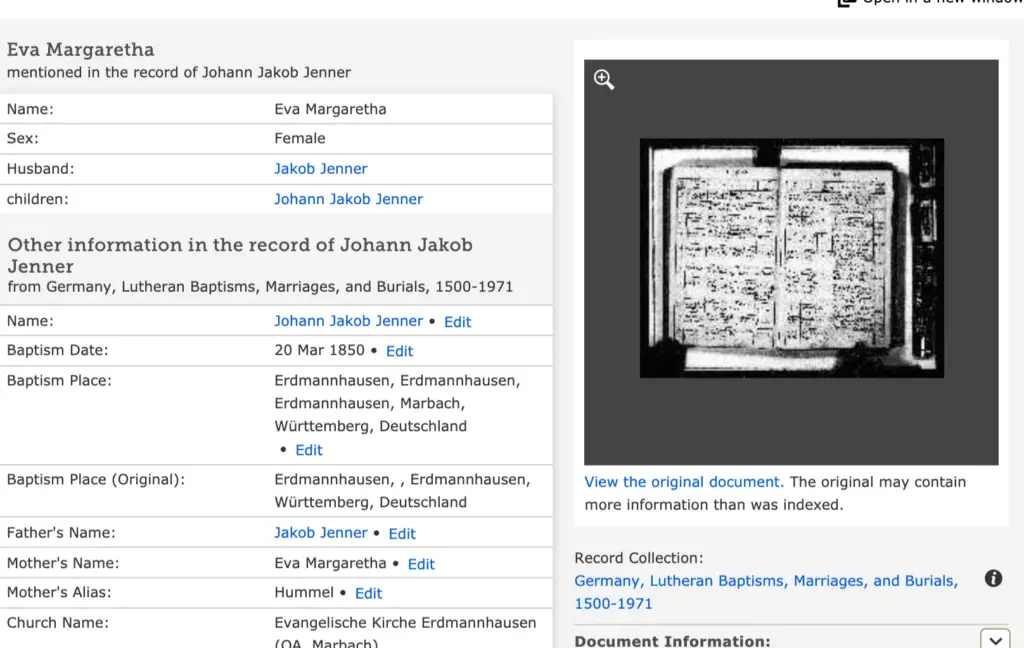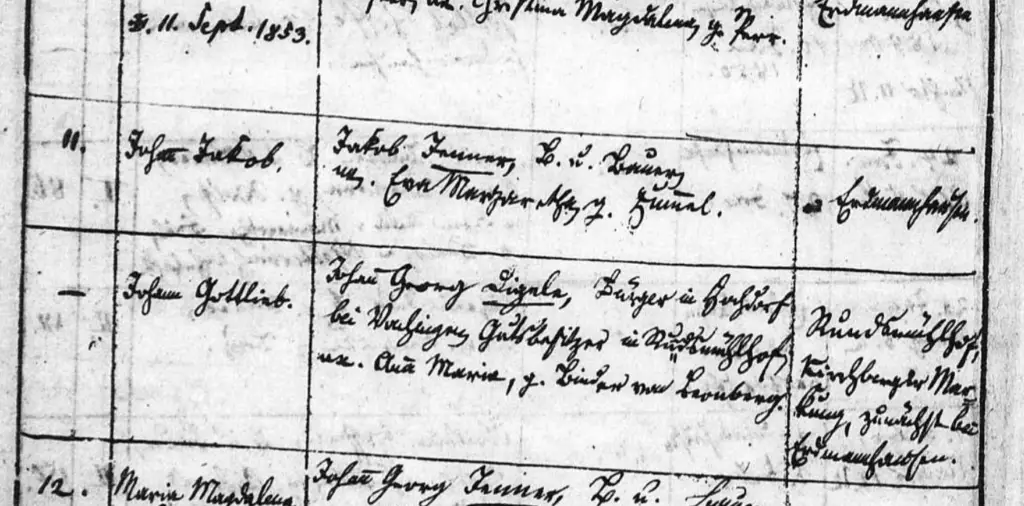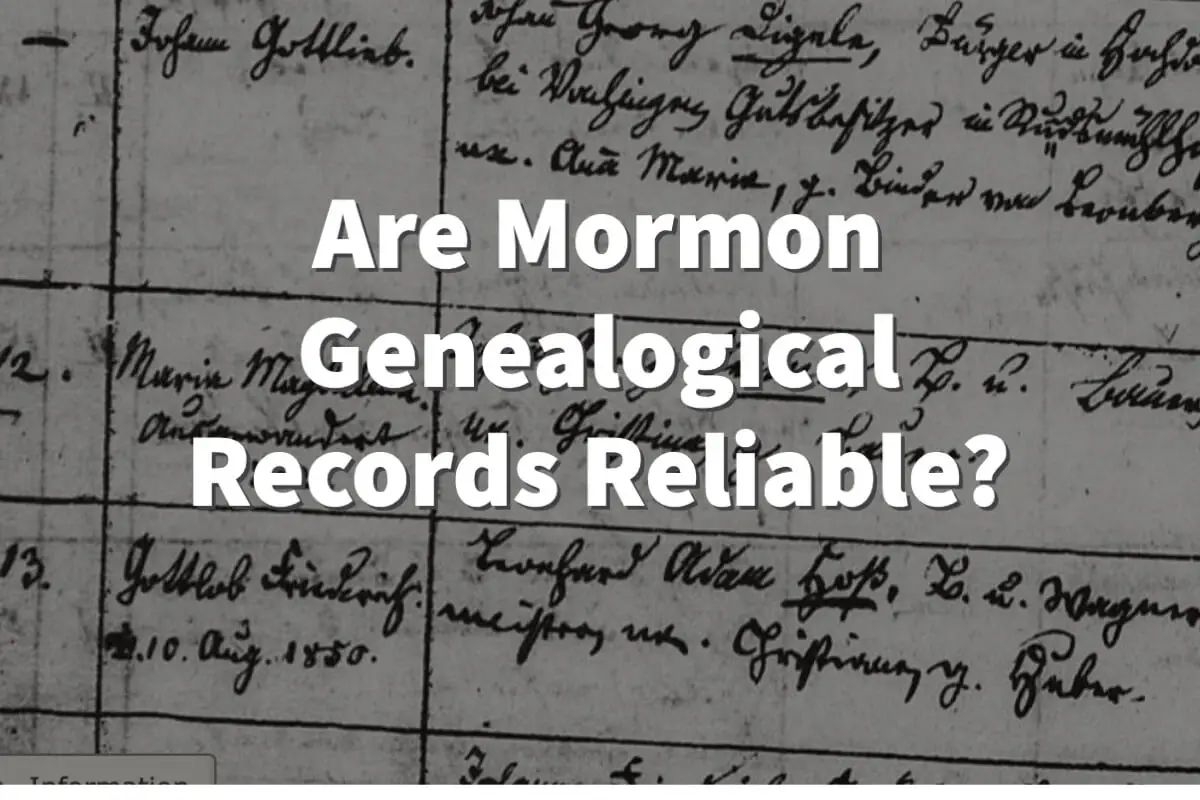I love doing genealogical research as there is so much you can learn about yourself and your family. It is fascinating to see your ancestors’ names on a German record from the 1700s.
The Mormon Church’s (The Church of Jesus Christ of Latter-day Saints) genealogical records are reliable. The genealogical records are photographed from original records so that you can check the original records. Even though the records are digitalized, I will usually check the original record to verify the digitalized information.
The fact that every record has a photograph of where and how they found the information means that you can look at the original record and verify the information.

Mormon Church Actively Seeks To Preserve Records
The Mormon Church, known by its proper name of The Church of Jesus Christ of Latter-day Saints, has long had a program to help preserve the genealogy records of the world. This is because, for example, an old church in Germany or Sweden burns down; usually, all the old books and records would burn with it.
FamilySearch, which is part of The Church of Jesus Christ of Latter-day Saints (Mormon Church), has a department dedicated to working to help to preserve these records worldwide. An Army of mostly volunteers is sent to locations worldwide with equipment to photograph the records.
This digitalized copy helps to ensure that the information on the records is preserved for generations to come.
FamilySearch and The Church of Jesus Christ of Latter-day Saints (Mormon Chruch) spend money, time, and effort to help preserve the world’s genealogy records.
Here are some reasons why the preservation of these worldwide records are important:
- Disaster Can Wipe Them Out – A disaster as a fire, or even a natural disaster can essentially wipe out the records in a matter of minutes. If the records are not photogrpahed or digitized then the records is lost forever. This is why FamilySearch contines to actively photograph the records to help preserve the records through a digital copy of them.
- Poor Storage Conditions – Some records are placed in a moldy old basement. In many parts of the world records are decaying daily from things as mold, mildew, rain, sunlight exposure or even insects or other infestations. This means that precious records could be lost simply because no one is taking care of them or looking after them.
- Wars and Political Unstability – Political unrest or unstabiity can also lead to the loss of records. Rioters may torch a goverment building and in the process all the records are lost. Countires that have suffered from wars usually also lose many of their most important records.
- Scheduled Destruction – Some places in the world feel the records are too old and so they schedule to destroy them. In a case like this FamilySearch will try to come in and try to save the records from destruction.
- Loss of Oral Genealogy – In a place like Africa and Asia alot of the genealogy maybe in the minds of the older generation. As this generation dies off so does the knnowledge they have. In some parts of the world the orals records are also important.
This is why Family Search, part of the Mormon Church (The Church of Jesus Christ of Latter-day Saints), has invested so much to photograph the world’s records. These records they photograph are not altered in any way but are photographed for preservation.

Extraction and Original Records
The Church of Jesus Christ of Latter-day Saints, along with FamilySearch, has a team of thousands of volunteers than work in the extraction program. In the program, many highly skilled volunteers will use their language skills to read the old records and then put the information of the record into the computer.
The inputting of the records into the computer helps ensure the records are easier for people to search to find the records they need. I check many of these records to work on my own genealogy, and I can tell you it is not easy to read many of the old records as the writing, language, and even calligraphy are difficult.
I am amazed at how usually the digitalized record is correct when compared to the original.
Information extracted or digitalized is usually name and important dates as birth, christening, baptism, marriage, death, and burial. Census, military, and other important records are also digitalized.
Because the information from the photographed record and that copy of the original record are placed online, you easily check the original record against the digitalized information to verify the record.
If you have set up a Family Tree for your ancestors, the FamilySearch program will also give you some suggestions of records in their vast collection that could be your ancestors. I really love this feature and use it a lot to find information on my ancestors.
The extraction or the digitalized information for the original records is not always perfect, as many old records are tough to read. I have some relatives whose last name is Strecker, and I have found records with Stricker, Strucker, and Stinker.
In a case like this, I make sure all the other information is the same, and I will always verify by checking the original records.
The extraction of the records goes through many checking levels, but even with this, as most of the older records are handwritten and written in an old script, it can be tough to read the record. So even though FamilySearch does take many steps to ensure everything is 100% correct, I will always verify by checking the original record.
This is why I feel like the records of the Church of Jesus Christ of Latter-day Saints (Mormon Church) and FamilySearch are reliable is because the original records are always attached to the digital record,d so you can always view the original record to check and verify it yourself.
Anyone who searches for their ancestors should thank organizations as FamilySearch and the thousands of volunteers at The Church of Jesus Christ of Latter-day Saints who actively work each day to preserve and digitalize millions of the world’s records. It is because of them and their effort that we have so many records available and preserved today.
It also means that you can be home on your computer and view original records of your family from another part of the world. For me, this has been a great blessing, and I have found many records of my family via the records on FamilySearch.
The fact you can check a copy of the original record ensures that the records from The Chruch of Jesus Christ of Latter-day Saints (Mormon Chruch) and FamilySearch are very reliable records you to use for your family history research.
The Hummel Family is a website all about Family History research. Our Focus is on Swedish, German, English, Scottish, and American Genealogy. We also talk a lot about Asia and China as we had ancestors who spent many years in China.
You are welcome to join us and become part of our community by signing up for our FREE newsletter, The Hummel Family; sign up by clicking here.
Related Content
What Does It Mean When The Bible Says To Avoid Genealogies In Titus 3:9?
In Titus 3:9, the Apostle Paul was not condemning genealogy. Instead, the Apostle Paul was warning us about bragging about our genealogy or making up false information about our ancestors so that we look good. The Apostle Paul was not against genealogy or about us discovering our ancestors.
You can learn more by reading What Does It Mean When The Bible Says To Avoid Genealogies In Titus 3:9? by clicking here.
What Is The Purpose of Genealogy?
The purpose of genealogy is to study family, family history and tracing our lineage or ancestors. The purpose of genealogy goes far beyond the dates, names, and places of our ancestors. This is because as you do your genealogy, you begin to learn more about your family and yourself. Genealogy helps unite and link families together as you discover things about your family that you did not know.
By clicking here, you can learn more about Genealogy by reading our blog What Is The Purpose of Genealogy?.
